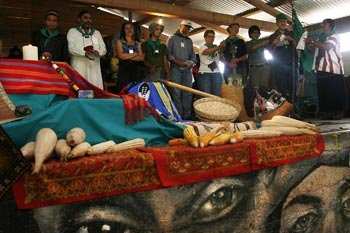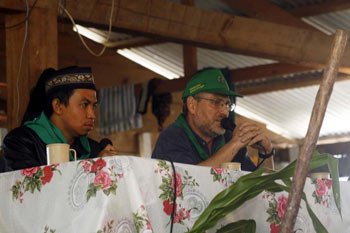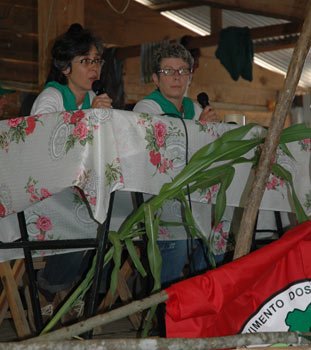The Narco News Bulletin |
August 15, 2018 | Issue #46 |
narconews.com - Reporting on the Drug War and Democracy from Latin America |
|
Caracol Morelia, 25th July: Wide awake at seven in the morning after the previous nights famous popular dance, hundreds of hooded indigenous, along with thousands of guests from four continents attended the inauguration ceremony for the work-table for Via Campesina, a global organisation of campesinos made up of 140 organisations from 56 countries. After honouring the elements of life - earth, seeds, fire, air and water - cared for by campesinos the world over, they sung the organisations' anthem and so prepared the public for five hours of presentations on the campesino situation in the guest countries: Brazil, Indonesia, India, Canada, US and Thailand.
 Photo: D.R. 2007 Moisés Zúñiga |
In a world of such rich culture, so many languages, so many ecosystems, so many skin colours, campesinos of the globalised world are caught in the same mechanism that impedes the survival of the oldest human activity: agriculture. Ten years of neoliberal policies taking land as commodity and millions of dollars driving practices that leave the land without life and campesinos without land. While implementing industrial and capitalist development policies the bad governments have generated series of grave problems for the campesinos of the world. "The burden falls on the poor," said the Thai representative. She pointed out that "governments only serve the rich. They make laws that are selective and that depend on whether one is rich or poor, or from the mafia governing the country... They have approved laws to take our natural resources from us. Politicians are businessmen in disguise, using development to their benefit." Soraia Soriano, representative from Movimiento Sin Tierra (MST), expressed the same complaint: "The Brazilian countryside has become a field of soya, sugar cane and eucalyptus. Agro business and the government gain because they export everything." She criticised harshly the Bush-Lula alliance to control the global production of bio-combustibles, like ethanol. "Governments administer land and other natural resources in a western way," the Thai representative deplored.
 Photo: D.R. 2007 Moisés Zúñiga |
The crisis in the countryside in India is at such a point that since 1992 150,000 desperate campesinos have committed suicide. In order to create "special economic zones," 140,000 Indian families lost their land and 80,000 rural workers lost their jobs. Reviving an 1894 law (from English colonialism) the state of India already bought and gave 120,000 hectares to private enterprises. A little while ago they announced the second phase in which they will take another area just as large. According to Yudhvir Singhe of the Bhartiya Kissan Campesina Union (BKU) of India national coordination, the government is deceptive, promising sources of work and a better future in these "special economic zones." Her opinion was that "the only economic security is a piece of land," despite only having a quarter of a hectare per family on average.
They suffer the same problems in the so-called "first world" countries. Calisa of Canada's National Campesino Union condemned the fact that since the 1960s campesinos - who represent only 2 per cent of the Canadian population - have already lost half their farms. She said that it is very difficult to start a farm since none of the younger generation could pay the loans off.
With the introduction of the corporations' monocultures, respect for Mother Earth is also lost; the thousand-year-old agricultural know-how along with human and cultural relations. "Milk producers can't drink their own milk, it is full of anti-biotics and never sees daylight... Vegetables grow in land dead from so many chemical products," said Emmanuel of Quebec's Countryfolk Union (Canada). The indigenous Pagaqueyor campesino delegate of Northern Thailand contrasted the situation, praising traditional agriculture: "Traditional agriculture of ploughing and rotation respects nature. It lets the land rest to recover the minerals in the ground. We keep forest reserves where we collect medicinal plants... that's why we demand the right to use and administer our own forest resources... because we, the indigenous, know what's best for us. Living with the forest is our way of life." He blamed public schools (in the past, education was in the hands of Buddhist monks) of depreciating the value of the traditional practice of ploughing as "graze-slash-burn." He is also of the opinion that the schools worked in a way of indirect dispossession: "School programs are a false help for indigenous people... we have lost our history, our traditions, our agricultural methods... They have weakened our affiliation between the indigenous and the diversity of food."
Before the dramatic situation in the countryside we need to unify, as Emmanuel said, so that "agriculture returns to it's first vocation of feeding people in a healthy way." Or in the words of Calissa: "We have to recover the agro culture, the culture of campesinos, because the territory and culture of the people is worth more than money and power."
 Foto: D.R. 2007 Ingrid Fadnes |
In Brazil the MST with 2 million members managed to recover land (the size of Italy) for 350 families. "But," said Soraia Soriano, "after that, we realised it wasn't enough and we have to organise other aspects of campesino life, such as production, school, goods and health." That's why, in 2003, a national school was inaugurated where they teach the true history and national social struggles including other countries. They also organise cultural projects to preserve cultural heritage. In the field of health, they prepare medicine from medicinal plants. Lastly, they started art cooperatives and give special attention to the active incorporation of women in their organisation.
Campesino organisations seek all alliances with other sectors of society in order to have more weight. That's why, they unite themselves in their struggles with "citizens concerned about the quality of food" (Emmanuel, Canada), traditional fishermen and slum dwellers (Thailand), friendly lawyers (Brazil). And then they unite internationally in Via Campesina to promote equality in economic relations, the exchange rate of goods, social justice, preservation and conquest of natural resources in a globalised and neoliberal world.
In this context, various Via Campesina delegates thanked the Zapatistas for the invitation to the Encuentro and said they had learned much from the Zapatista struggle. Yudhvir Singh told of feeling a "great connection" with the Zapatista people. "I return to my country with a lot of knowledge to share with my organisation which we will use." Sorai Soriano indicated that "the Zapatistas have been a strength for us. They face a thousand challenges. They are a constant example that different ways of life are possible... we are very similar, we have the same enemy and more or less the same ideas. We have many friends throughout the world... That's our strength."
Despite the similarities and having the same enemy, the big difference between the organisations of Via Campesina and the Zapatista organisations resides in relations with government. Although they all call themselves autonomous and independent from political parties, the Zapatistas are the only ones building a total autonomy in all aspects - organisation, health, education, sustainable business, etc. They are the only ones completely denouncing dialogue with the government for their demands. They are the only ones to realise these demands themselves, with no help from the treacherous government. On the other hand, the member organisations of Via Campesina seek to pressure their governments. Similarly, the Union of Canada Countrymen seeks to achieve legal recognition to have the power to influence food policies. In the same way, the Thai organisation tries to demand justice with "bare feet and empty hands." Soriano said in respect: "We want the government to take responsibility by giving us homes, roads, drinking water, electricity, etc., because it has a lot of resources. It must attend to our necessities." But at the same time he recognised that it's not always the case and one is obligated to organise oneself.
Be that as it may, the Encuentro between the Zapatistas and the People of the World showed today once again that capitalist forces aren't everywhere and that resistance and heroic protest against neoliberalism and for humanity is expanding daily across the whole of planet Earth.
Originally published in Spanish August 2
Translation by Deano